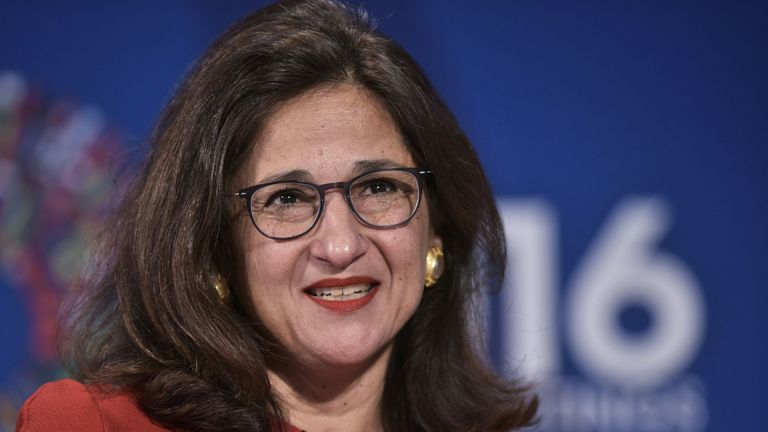Bank of England gets the safe choice to manage UK's post-Brexit future
Sky's economics editor says the new governor will have a towering inbox, but the experience to navigate the challenges ahead.
Friday 20 December 2019 10:21, UK
Sometimes the most surprising thing about something surprising is how unsurprising it really is.
For most of the past few years Andrew Bailey, the chief executive of the Financial Conduct Authority, has been the favourite to be appointed the next Bank of England governor.
Today, Chancellor Sajid Javid confirmed that Mr Bailey, who has spent most of his professional life at the Bank, would indeed ascend to that role when Mark Carney stands down at the end of January.
But the funny thing is that despite being the heir apparent for so much of his career, by the time Mr Bailey's name was announced it actually came as something of a shock.
There have been many stories written by various news outlets over the past few months confidently asserting that Mr Bailey had been overlooked by the new government - that they would instead plump for LSE director Minouche Shafik or American central banker Kevin Warsh.
In the end they were all wrong. An uncharitable observer would say that says a lot about how well-informed some of those journalists really are. But the eventual surprise about Mr Bailey's appointment reflects a few factors.
First, the past year or so has been a difficult time for the FCA, which was beset by the problems at Neil Woodford's investment fund and London Capital and Finance.
Many assumed that these problems would rule Mr Bailey out altogether.
Second, one of the criteria Philip Hammond and Mr Javid set was that the new Governor should have a strong international profile. Since the FCA is primarily a domestic institution many people took from that that he wouldn't stand a chance.
As it happens, Mr Bailey spends plenty of time at international conferences such as IMF summits. He is very well regarded in Whitehall and Downing Street. And he was, in the final calculation, seen as the safest pair of hands for a job as crucial as running the Bank of England.
In a sense the new Johnson government have done much the same as the Trump administration which chose Jay Powell - a safe pick - as chairman of the US central bank, the Federal Reserve.
While plenty of outlandish names were mentioned as possible successors to Mr Carney, including some renowned Brexiteers, in the end Downing Street opted for someone technocrats and markets will probably be most comfortable with.
Mr Bailey is not a superstar central banker in the mould of Mr Carney.
He is a mild-mannered technocrat, well-regarded at the Bank and Treasury, with a prodigious grasp of detail and an independent bearing. He is, in many ways, your archetypal central banker.
And while he has had to face criticism in recent years, he is one of the few Bank officials whose reputation was enhanced by the financial crisis rather than being diminished by it.
That said, there are some big questions.
While he has plenty of experience in managing the financial system and setting rules for banks, he has never been on the Monetary Policy Committee.
Economists often wonder whether someone setting interest rates is a hawk (likes them higher) or a dove (likes them lower). In Mr Bailey's case we don't know either way.
The Bank faces many challenges in the coming years: it may have to raise interest rates in the face of a likely post-election government splurge.
It will have to guard its independence jealously.
It will have to clean up the mess from the recent scandal over access to audio feeds from its press conferences.
And, most of all, it will have to manage the UK economy and financial system as it leaves the European Union.
A towering inbox for Mr Bailey, then. But the long wait to find out who will succeed Mr Carney is now finally over. Britain has a new government. It now also has a new governor.







